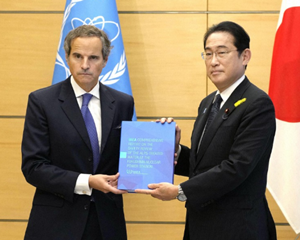The U.N.'s nuclear watchdog approved Japan's plan to release treated radioactive water from the tsunami-wrecked Fukushima plant into the ocean on Tuesday.
周二,联合国核监督机构批准了日本将被海啸破坏的福岛核电站处理过的放射性水排入海洋的计划。
International Atomic Energy Agency chief Rafael Grossi called it "a very special night,"
国际原子能机构总干事拉斐尔·格罗西称这是“一个非常特别的夜晚”,
as he handed Japanese Prime Minister Fumio Kishida the final report after a two-year review.
他向日本首相岸田文雄递交了经过两年审查的最终报告。
It said Japan's plans were consistent with global safety standards and that they'd have a, quote, "negligible radiological impact to people and the environment."
该机构表示,日本的计划符合国际安全标准,“对人类和环境的辐射影响可以忽略不计”。
"The IAEA will have a continued presence at the site, we will continue the review if the plan moves forward because as you know this is a decision by the government."
“国际原子能机构将继续出现在现场,如果该计划取得进展,我们的审查将持续进行,因为如你们所知,这是一个政府决定。”

Japan's government maintains the process is safe, insisting it will act with transparency,
日本政府坚称这一过程是安全的、会透明行事,
and saying it has treated the water used to cool the fuel rods of the Fukushima plant after it was damaged by the 2011 earthquake and resulting tsunami.
并表示已经妥善处理了用于冷却福岛核电站核燃料棒的水,该核电站在2011年的地震和海啸中受损。
Japan hasn't specified a date to start the release of the water -- enough to fill 500 Olympic-sized swimming pools.
不过日本方面尚未确定开始排放这些足以填满500个奥运会规模的游泳池的水的日期。
Japanese fishing unions have long opposed the plan.
长期以来,日本渔业工会一直反对该计划。
Some neighboring countries have also complained over the years about the threat to the marine environment and public health,
多年来,日本的一些邻国也抱怨该计划会对海洋环境和公众健康带来威胁,
with Beijing emerging as the biggest critic, calling for the suspension of the plan.
中国政府是其中最主要的批判者,一直在呼吁暂停该计划。


